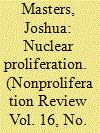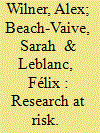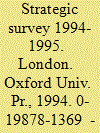|
|
|
Sort Order |
|
|
|
Items / Page
|
|
|
|
|
|
|
| Srl | Item |
| 1 |
ID:
087043


|
|
|
|
|
| Publication |
2009.
|
| Summary/Abstract |
Indonesia, Thailand, and Vietnam recently announced that they are launching nuclear energy programs, and Malaysia and the Philippines soon may follow suit. As a result, by 2020, at least three states in Southeast Asia could possess latent nuclear capabilities-the option to pursue military applications of dual-use nuclear technology. Analysis of the nuclear programs, domestic proliferation pressures, and the external threat environment in Southeast Asia leads the authors to conclude that the nuclear intentions of states in that region are entirely peaceful and the probability of future nuclear breakout there is low. However, this finding does not justify complacency. In the long term, the benign outlook for regional security may change, and in the near term weak regulatory regimes present serious challenges to nuclear safety and create opportunities that non-state actors may exploit. To minimize these risks, the authors recommend creating a "proliferation firewall" around the region, which would combine strong global support for Southeast Asian nuclear energy programs with innovative regional multilateral nuclear arrangements.
|
|
|
|
|
|
|
|
|
|
|
|
|
|
|
|
| 2 |
ID:
091668


|
|
|
|
|
| Publication |
2009.
|
| Summary/Abstract |
As the potential for the involvement of corporations in the manufacture of nuclear weapons has increased, particularly through dual-use technology, global regulation has failed to keep pace. Where regulation of private corporations does exist, in the form of treaties, UN resolutions, or more informal arrangements, the obligations fall only on states. This state of affairs is a result of international law's traditional deference to state sovereignty; yet, it has led to significant shortcomings in the global regulatory regime, where states are unwilling or unable to meet their obligations. While radical departures from the traditional model of international law might remove the regulatory gaps caused by noncompliant states, such changes are unrealistic in the current political climate. More realistic changes must be focused on, offering greater recognition of the role of private corporations in nuclear proliferation and increasing state compliance with existing regulation.
|
|
|
|
|
|
|
|
|
|
|
|
|
|
|
|
| 3 |
ID:
187381


|
|
|
|
|
| Summary/Abstract |
Although traditionally viewed as paragons of international cooperation, research institutions and universities are becoming venues for hostile foreign activity. Research security (RS) refers to the measures that protect the inputs, processes, and products that are part of scientific research, inquiry, and discovery. While RS traces its roots to the 1940s, global economic and research and development competition, the nexus between dual-use technology and military power, a cluster of newly emerging industries, scientific responses to the COVID-19 pandemic, and societal shifts towards digitization, combine to challenge RS in unique ways. With an eye on safeguarding traditional notions of open science, our article refurbishes Canadian RS within the context of emerging challenges and international responses. Detailing the legal, extralegal, illegal, and other ways in which RS is threatened, we use a comparative assessment of emerging responses in the US, Australia, Japan, and Israel to draw lessons for Canada.
|
|
|
|
|
|
|
|
|
|
|
|
|
|
|
|
| 4 |
ID:
005305


|
|
|
|
|
| Publication |
London, Oxford Univ. Pr., 1994.
|
| Description |
264p.
|
| Standard Number |
0-19878-1369
|
|
|
|
|
|
|
|
|
|
|
|
Copies: C:1/I:0,R:0,Q:0
Circulation
| Accession# | Call# | Current Location | Status | Policy | Location |
| 036549 | R 355.005/IIS 036549 | Main | On Shelf | General | |
|
|
|
|
|
|
|
|
|